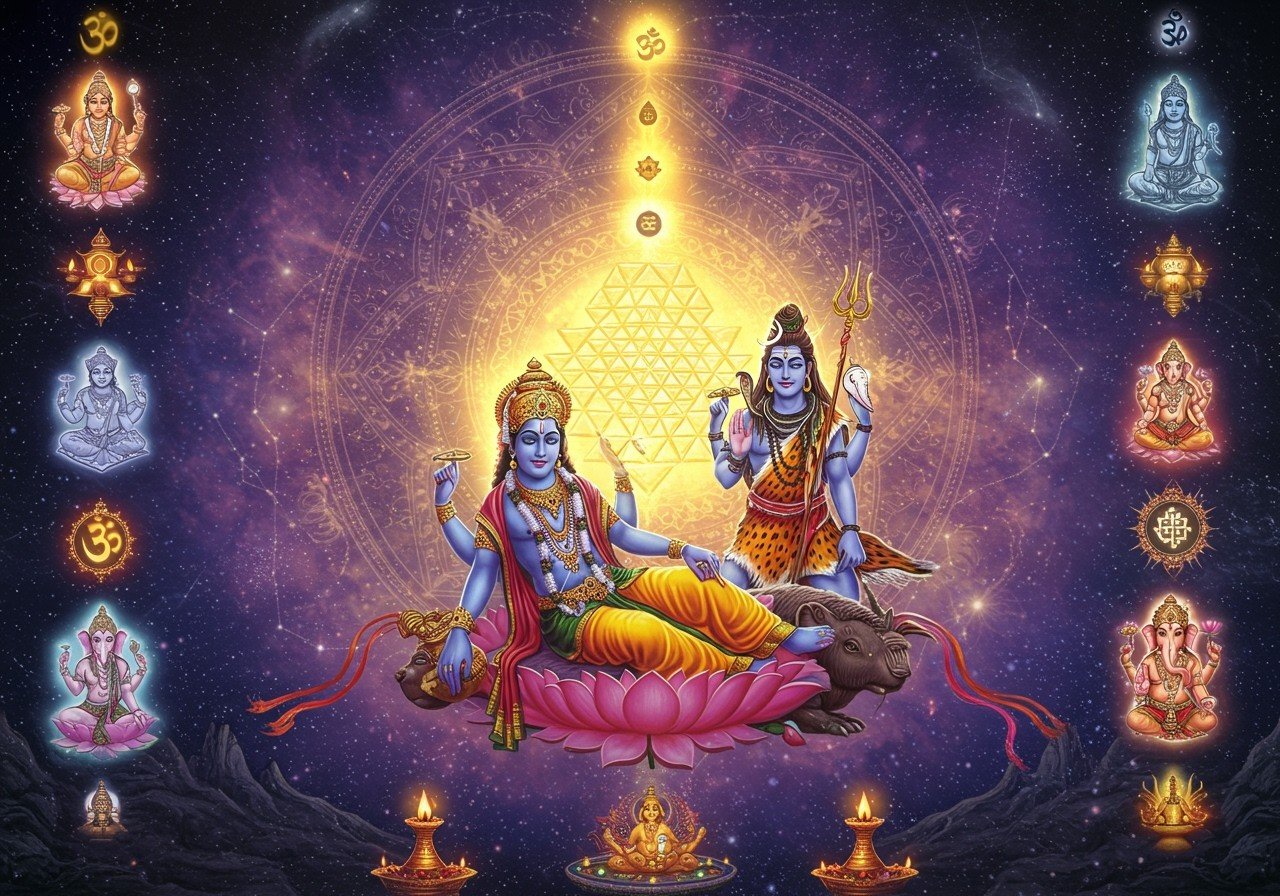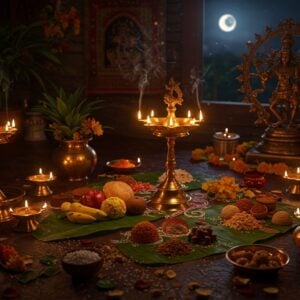
Hinduism, a rich and diverse tradition, encompasses a wide array of beliefs and practices centered around the concept of God. Grasping the nature of the divine within Hindu culture is crucial, as it profoundly influences daily life, from personal rituals to societal values. Sacred texts like the Vedas and Upanishads delve into the nature of the divine. Mythology and epics, such as the Ramayana and the Mahabharata, provide narratives that shape popular perceptions of God, offering stories of devotion, dharma, and the interplay between the human and the divine.
Who is God in Hinduism?
The concept of God in Hinduism is intricate and multifaceted. At its core lies Brahman, the infinite, eternal, and unchanging reality that is the source and foundation of all existence. This ultimate reality pervades everything, and all beings are connected to it. Each individual possesses an Atman, or soul/inner self, which is a reflection of Brahman, a spark of the divine within. This connection between Atman and Brahman is a central theme in Hindu philosophy.
Hinduism acknowledges a multitude of deities, each representing different aspects or manifestations of Brahman. This allows individuals to choose a personal deity, or Ishta Devata, through which they can connect with the divine in a way that resonates most deeply with them. Whether it’s through devotion to Vishnu, the preserver, or Shiva, the transformer, the choice reflects a personal preference and spiritual inclination. Hinduism accommodates various interpretations of the divine, including monotheistic, polytheistic, and pantheistic views, reflecting its inherent inclusivity.
- Major Deities: Vishnu, Shiva, and Devi are central figures in different sects of Hinduism, each with dedicated followers and unique iconography. These deities often represent fundamental cosmic principles, such as preservation, transformation, and divine power.
- Avatars: The concept of avatars, divine incarnations like Rama and Krishna, plays a significant role in Hindu belief. These avatars are believed to descend to Earth to restore dharma and guide humanity, embodying divine principles in tangible forms. Their stories offer moral guidance and inspiration.
- Goddesses: Powerful goddesses like Durga and Lakshmi hold prominent positions within the pantheon, representing different facets of the divine feminine, from strength and protection to prosperity and abundance.
This diversity of deities allows for a deeply personal connection to God in Hinduism, catering to different temperaments and spiritual inclinations. The emphasis on personal experience makes the divine accessible and relevant to each individual’s life.
How Many Gods are There in Hinduism?
The question of how many gods exist in Hinduism is a complex one, with answers as varied as the tradition itself. One key concept is the Trimurti, consisting of Brahma, the creator, Vishnu, the preserver, and Shiva, the transformer (or destroyer). This triad represents the cyclical nature of creation, preservation, and dissolution, reflecting the dynamic forces at play within the universe.
Beyond the Trimurti, Hinduism encompasses a vast pantheon. The concept of 33 ‘Koti’ gods, often misinterpreted as 33 million deities, actually refers to 33 types or categories of divine beings. These divinities embody various aspects of the one ultimate reality, Brahman, enabling worshippers to connect with the divine in diverse and personalized ways. This understanding emphasizes the underlying unity within the apparent multiplicity of gods.
Hinduism’s inclusivity extends beyond the major deities. Local deities and folk gods enrich the tapestry of daily religious practices, adding a regional flavor to spiritual expression. Family deities, or Kula Devata, hold special significance in familial rituals, passed down through generations. Grama Devata, the village deity, plays a vital role in community worship, fostering a sense of collective identity and spiritual protection. These localized deities bring a sense of intimacy and immediacy to spiritual life.
Despite the multitude of deities, Hinduism emphasizes that all gods are ultimately expressions of the one supreme reality, Brahman. This philosophical understanding bridges the gap between the many forms and the one essence, making Hinduism unique in its inclusivity and profound depth of spiritual insight.
What is God in Hinduism?
At the philosophical heart of Hinduism lies the question: What is God? Different schools of thought offer unique perspectives on this profound inquiry. Advaita Vedanta, a prominent philosophical system, teaches non-dualism, asserting that Atman (the individual soul) and Brahman (the ultimate reality) are essentially one and the same. This perspective suggests that God is not separate from us but resides within each being.
Other schools of thought, like Dvaita and Vishishtadvaita, present alternative viewpoints. Dvaita proposes a dualistic understanding, emphasizing a personal relationship with a distinct and separate divine entity. Vishishtadvaita, or qualified non-dualism, suggests a unique connection between the individual soul and God, while still acknowledging their distinctness. These differing perspectives highlight the intellectual richness and depth of Hindu philosophy.
Hinduism recognizes multiple paths to connect with the divine. Bhakti Yoga, the path of devotion, cultivates love and a personal relationship with God through prayer, rituals, and expressions of faith. Jnana Yoga, the path of knowledge, seeks to understand the true nature of reality and the divine within through study, contemplation, and self-inquiry. Karma Yoga emphasizes selfless action as a way to experience God in daily life, performing one’s duties without attachment to the fruits of labor.
The concept of Maya, often described as illusion or the veil of ignorance, suggests that our perception of reality is obscured, preventing us from perceiving the true nature of things. Spiritual practices aim to lift this veil, revealing the underlying unity and divine essence that permeates all existence. The ultimate goal for many Hindus is Moksha, liberation from the cycle of birth and death, achieved through the realization of unity with Brahman.
Hinduism invites individuals on a journey of self-discovery and spiritual exploration. Its rich tapestry of beliefs and practices offers guidance and support while respecting individual paths to the divine. Learn more about Hindu philosophy.
How Poojn.in Can Help You Connect with the Divine
Poojn.in, India’s largest cultural goods and services store, provides a wide range of products and resources to support your spiritual practice and connection with the divine. Whether you seek to deepen your understanding of Hindu deities or enhance your personal worship, Poojn.in offers a curated collection to meet your needs.
- Puja Samagri Kits: Find complete puja kits designed for worshipping specific deities like Lord Vishnu, Lord Brahma, and Lord Krishna. These kits contain all the essential items you need for a traditional puja ceremony. Explore our range of puja kits.
- Murtis (Idols): Discover high-quality brass and copper murtis crafted by skilled artisans, representing various deities with intricate detail. These murtis serve as a focal point for devotion and reverence. Browse our collection of murtis.
- Traditional Puja Items: Enhance your puja rituals with authentic items like dhoop, agarbatti (incense sticks), and ghee lamps, creating a sacred atmosphere for worship and contemplation. Find all the puja essentials you need here.
- Sacred Texts and Books: Delve deeper into Hindu scriptures and learn more about the gods and goddesses through our selection of religious books. Expand your knowledge of Hindu symbolism.
Visit www.poojn.in to explore our complete collection of authentic puja items and spiritual products.
Embracing the Divine Journey
Exploring the Hindu concept of God reveals a rich tapestry woven with diversity, tradition, and profound spiritual wisdom. Hinduism does not restrict itself to a single path or belief system. Instead, it embraces a multitude of deities, each a reflection of different aspects of the one ultimate reality, Brahman. Whether through the Trimurti, the major gods and goddesses, or the local deities that bless homes and villages, Hinduism offers a profoundly personal and inclusive spiritual experience.
Understanding the divine in Hinduism involves not just knowing the gods but actively engaging with them through various paths like Bhakti, Jnana, and Karma Yoga. These paths offer frameworks for spiritual growth and guide seekers toward the ultimate goal of Moksha, the liberation from the cycle of birth and death and the realization of unity with the divine. Learn about overcoming challenges in meditation.
By embracing the diversity of beliefs and practices, Hinduism encourages individuals to find their own unique path to the divine. It respects individual journeys and fosters personal connections with God, making the spiritual quest one of profound personal significance and a glimpse into universal truth.


